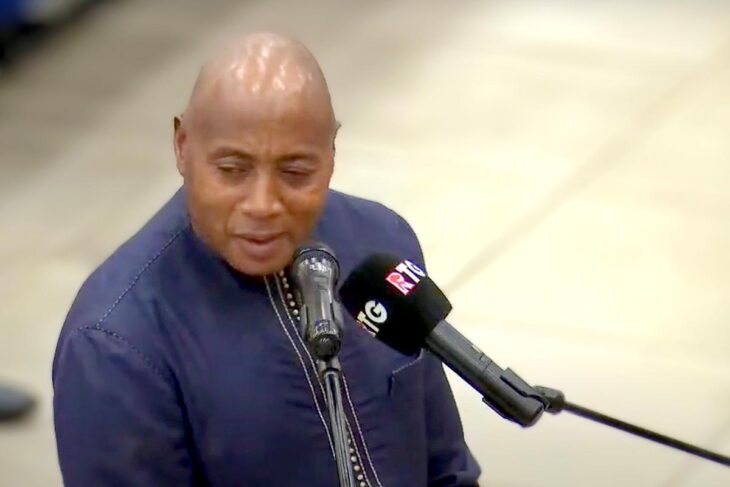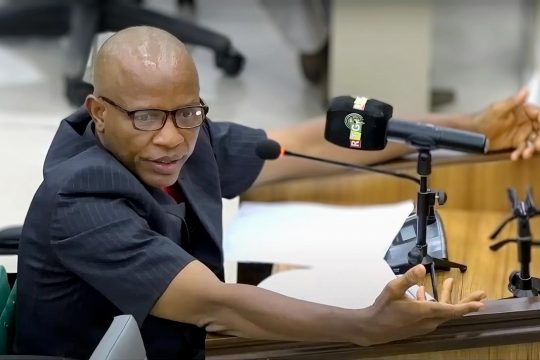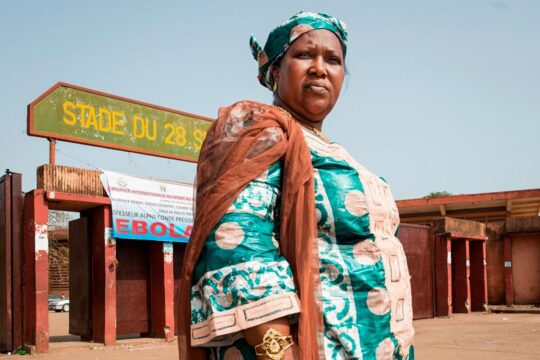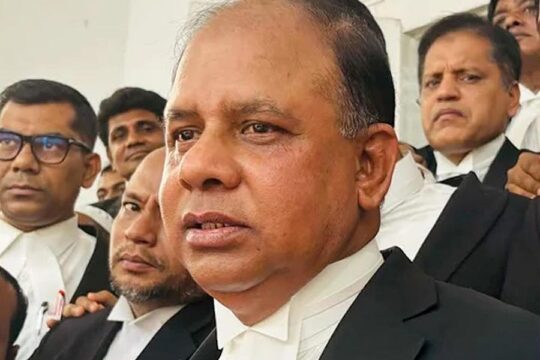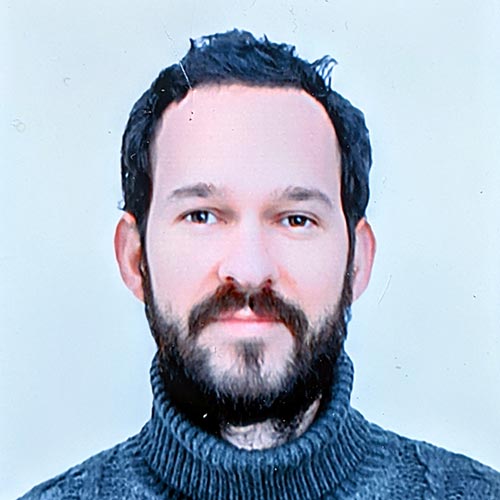On Tuesday April 11, 2023, Ben Youssouf Keïta, a 69-year-old surgeon and politician, was called to the stand. He is now the president of the Alliance for Change and Progress party. At the time of the events, he was a member of the political bureau of the Union of Democratic Forces of Guinea (UFDG). He was even the right-hand man of the party leader, Cellou Dalein Diallo, according to journalist Mouctar Bah, an informed observer of Guinea in the late 2000s.
Keïta is the third political opponent to be heard at the trial. He has just become a civil party in the case. "Some people are certainly wondering why, 13 years later, I am presenting myself today, and in a spontaneous manner,” he said. “Well, for two reasons. First, if my fate was more enviable than those who lost their lives, my wife suffered martyrdom at the stadium [she was beaten by soldiers and had her throat cut]." Second, as a political leader Keïta feels it is his duty to come and testify: "We have a moral responsibility towards those who died, because they are our activists. We are the ones who called them to follow us.”
No to Dadis as presidential candidate
On September 28, 2009, the main opposition parties -- united in a coalition called Forces Vives -- organized a meeting to say no to the possible presidential candidacy of Captain Moussa Dadis Camara, leader of the military transition. Security forces burst in on the rally, firing live ammunition into the crowd and sexually assaulting female activists. In the days that followed, killings and rapes continued. According to the report of the international commission of inquiry appointed by the United Nations, at least 156 people were killed and 109 women raped.
Keïta tells the story of his day.
It was 5.45 on the morning of September 28, 2009, when his phone rang. "It was my older brother retired from the Guinean army calling me,” he told the court. “This brother, I consider him a father, he followed me to the UFDG. He was one of the people in charge of the executive office, in the security commission. He told me 'Youssouf, don't go out today, it's forbidden, you have to stay at home’. At that time, we still remembered the events of January-February 2007, during which at least 129 young Guineans were killed in cold blood during demonstrations. As my brother was insisting and it was unusual, I panicked." Then, according to his testimony in court, Ben Youssouf Keïta said to himself: "If I don't leave, I will be considered a traitor, a coward. What must happen will happen.”
Warnings don’t stop the opposition
At 6:00 a.m. he said goodbye to wife and rushed into a pick-up truck, taking his 25-year-old son with him. He crossed Conakry at full speed, he said, to reach the residence of Cellou Dalein Diallo, not far from the stadium. "It was a first signal. Usually it took 30 to 40 minutes, not ten. Everything was empty.” Arriving at the UFDG leader's house, Keïta told him about the warning he had received earlier. "Cellou had also received some information during the night. The warnings were not wrong,” he continued. “But according to him, we had to go, and we were going to go. I was very comforted by his position, his determination to fight to the end.”
The two men set off towards the home of Jean-Marie Doré, another opponent and head of the Union for the Progress of Guinea (UPG). The political leaders had made an appointment to meet there. Once there, his householders were hesitant. "Jean-Marie Doré tells Cellou, Sidya (Sidya Touré, president of the Union of Republican Forces) and the others that he cannot go,” they said, according to Keïta. “He has just spoken to the Head of State by telephone. The latter asked him to wait for the arrival of a delegation to meet with the leaders at his home.” Touré received the same call late at night, he said, but felt it was impossible to postpone the rally. Diallo spoke up, according to Keïta, saying: "We have to leave, because the population has already turned out, we have no way to delay the rally." All the opposition leaders - with the exception of Doré - then set off to join "the bulk of the troops at the stadium".
"There was so much noise, you couldn't hear the gunfire"
A "human tide" awaited them there, according to Ben Youssouf Keïta, an estimated several thousand people. While the politicians had planned to make their speech on the esplanade in front of the stadium, they were dragged inside by a frenzied crowd. "It was euphoria, celebration,” he recalled. Keïta climbed into the stands with the other leaders. There was an atmosphere of joyful chaos. "There was so much noise, you couldn't hear the gunfire," he told the court. Suddenly, he saw people starting to fall under fire. The danger was getting closer, and everyone was fleeing. It was "every man for himself".
Keïta stayed next to his leader. A hooded soldier advanced towards them. He called out to Diallo and ordered him to come down from the stands. The UFDG leader did not comply. The soldier charged at him, made him fall to the ground and hit him brutally. Keïta escaped and miraculously managed to get out of the stadium. But in front of the entrance, just as he thought he was out of trouble, he came across a soldier armed with a piece of wood who tried to smash his skull. Keïta protected himself and escaped with a broken hand and a wound on his back. Diallo suffered four broken ribs. Several opposition leaders were injured that day, but none fatally.
Opposition responsibility?
Ben Youssouf Keïta was admitted to the emergency room of Donka Hospital, he said, around 2-2.30 in the afternoon. While waiting to be taken care of, he saw "young people, women, lying around moaning”. The Minister of Health, Colonel Abdoulaye Chérif Diaby who is now in the dock, "passed within a metre” of him, according to the witness, reprimanding the wounded. He was "furious", according to Keïta. "I am here today to understand,” he told the court. “I have absolutely no hatred against anyone, I do not cry vengeance and I do not want any compensation, neither material nor financial, but I want to understand. When you understand something you can tolerate it, bear it. Why didn't this Minister of Health, who took the Hippocratic Oath, act like a doctor? He didn't have the pity he should have when faced with those who suffer."
At the trial, the surgeon's testimony unleashed passions. The defence lawyers, more divided than ever, clashed. One of them questioned Keïta: "Doctor, you have maintained here that if you had complied with the request to postpone the demonstration on September 28, what happened at the stadium would not have happened. Do you stand by this statement?
Keïta nodded.
Lanciné Sylla, counsel for Moussa Dadis Camara’s former aide-de-camp Aboubacar Diakité ("Toumba") retorted:
"Do you agree with me that in this trial you, the political leaders, are victims and not defendants?"
"There is no doubt."
“As such, can we seek any responsibility against you in this trial?”
“Absolutely not.”
"We didn't think they would send men to the stadium with helmets and lethal weapons against the unarmed population," Keita said in defence. The scenario he painted through his words is that of a punitive, premeditated and inevitable attack against an opposition that was defying the authority of the head of state to defend democratic principles.
"Mr. Bah Oury said it here, and so did Mr. François Loucény Fall [the two politicians previously heard by the court]. Was it on the day of the demonstration itself that a postponement could be called?" asked Toumba's lawyer.
"From the moment the people were called out, it would take at least 48 or 72 hours to inform them that the demonstration was postponed," Ben Youssouf Keïta replied without hesitation.


